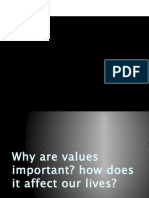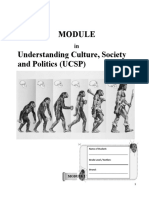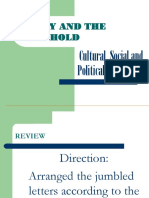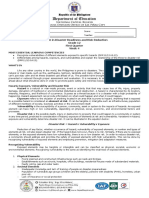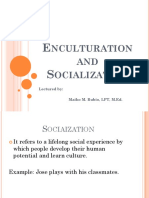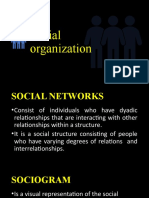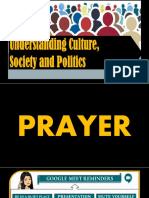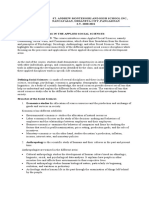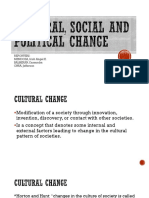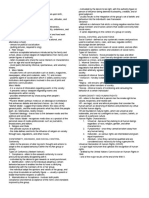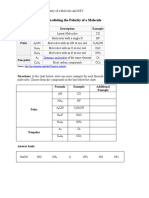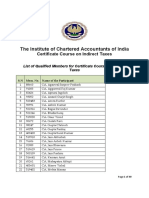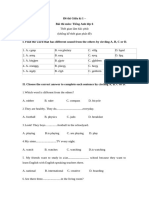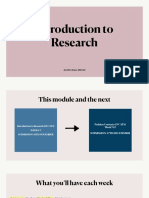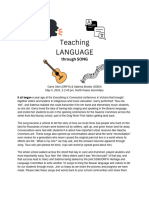0 ratings0% found this document useful (0 votes)
111 viewsUnderstanding Culture, Society and Politics
Understanding Culture, Society and Politics
Uploaded by
Andrea GamutanCulture is defined as an individual's way of life including food, clothing, and housing. Society is an organized group that shares territory, language, and culture to ensure survival and well-being. Politics refers to the theory and practice of government. Key aspects of culture include traditions passed down over generations. Society depends on interdependence and collective action. Politics determines systems of government and how power is managed for social order.
Copyright:
© All Rights Reserved
Available Formats
Download as DOCX, PDF, TXT or read online from Scribd
Understanding Culture, Society and Politics
Understanding Culture, Society and Politics
Uploaded by
Andrea Gamutan0 ratings0% found this document useful (0 votes)
111 views11 pagesCulture is defined as an individual's way of life including food, clothing, and housing. Society is an organized group that shares territory, language, and culture to ensure survival and well-being. Politics refers to the theory and practice of government. Key aspects of culture include traditions passed down over generations. Society depends on interdependence and collective action. Politics determines systems of government and how power is managed for social order.
Original Title
UCSP-Reviewer
Copyright
© © All Rights Reserved
Available Formats
DOCX, PDF, TXT or read online from Scribd
Share this document
Did you find this document useful?
Is this content inappropriate?
Culture is defined as an individual's way of life including food, clothing, and housing. Society is an organized group that shares territory, language, and culture to ensure survival and well-being. Politics refers to the theory and practice of government. Key aspects of culture include traditions passed down over generations. Society depends on interdependence and collective action. Politics determines systems of government and how power is managed for social order.
Copyright:
© All Rights Reserved
Available Formats
Download as DOCX, PDF, TXT or read online from Scribd
Download as docx, pdf, or txt
0 ratings0% found this document useful (0 votes)
111 views11 pagesUnderstanding Culture, Society and Politics
Understanding Culture, Society and Politics
Uploaded by
Andrea GamutanCulture is defined as an individual's way of life including food, clothing, and housing. Society is an organized group that shares territory, language, and culture to ensure survival and well-being. Politics refers to the theory and practice of government. Key aspects of culture include traditions passed down over generations. Society depends on interdependence and collective action. Politics determines systems of government and how power is managed for social order.
Copyright:
© All Rights Reserved
Available Formats
Download as DOCX, PDF, TXT or read online from Scribd
Download as docx, pdf, or txt
You are on page 1of 11
Understanding Culture, Society and Politics
Culture is generally defined as to the non-Western culture
the sum of individual’s way of which is considered primitive
life--food you eat, clothes you
wear and the house where you Society
live.
Society is generally defined as
S - Secularization the process
wherein religion was seperated
an organized group of
from the state and it eventually
interdependent people who share a
lead to rationalization.
common territory, language and
culture who act together for O - Open-mindedness is the
collective survival and well-being. key to discovering new things.
Politics refers to the theory, art C - Cultivating ideas for the far
and practice of government. future.
I - Inducing social, cultural,
Culture and political awareness within
C - it is a Collection of ideas, individuals.
beliefs, traditions and practice E - Explains how people
that has been passed on from interact to the different ways
generation to generation by of living by our ancestors and
oral and literary means. has them embraced the true
U - it promotes Unity by culture, practices, traditions,
advocating cultural relativism and beliefs which were
and historical particularism. “discovered”.
L - individuaLs shape culture T - Thinking of ideas or
just as culture shapes an
concepts on how the social
individual.
sciences studies human
T - Through interactions,
behavior and its relationship
people are able to generate
with the society.
concepts based on their-
U - Unique interpretations Y - Yet there is still much that
which would eventually create we need to learn and
the human language. understand about social
R - Rationalism in which science.
individuals are capable of
thinking, predicting, and Politics
calculating rather than
believing in religious dogma.
P - Presents the nature and
origin of the social sciences
E - Eurocentrism is a belief
such as anthropology, political
that Western culture is superior
science and sociology wherein lives. Sometimes good and
- bad.
O - anthrOpology focuses on I - It is important because it
the development of ancient determines what government
civilization and societies means. Far beyond the role of
through the years while, government, at any level,
L - PoLictical science deals politics determines how we
with the study of politics, manage the system that runs in
power and government the society.
I - socIology is the study of C - Communication is
patterns of human behavior, important to those who wield
how man and society interact political power in order for
and how it affects other them to control better the
people. direction and activity of the
government.
T - The political decision
people make will affect many S - Social science exists due to
the fact that socity cannot
easily be understood.
Culture is generally defines as the
sum of individuals way of life
Lesson 1 Food you eat, clothes you wear
Identity is the distinctive and the house where you live.
characteristics that defines an Kinds of Culture:
individual or is shared by those Material & Non-material
belonging to a particular group. Material -
Identity can also change over transportation,
the course of a person’s technology,
lifetime. architecture, etc.
It is important because they Non-material -
shape both individual and manners, taboos, facts,
group behavior as well as dance, music, and etc.
people’s views about other Society is generally defined as an
people and society organized group or groups of
Learning about one’s self, interdependent people who share
culture, and society entails common territory, language and
knowledge about various culture who act together for
identities and how these shape collective survival and well-being.
people’s views and behavior. Politics refers to the theory, art
and practice of government
Government - practice of Power - states granted to
power individuals or institutions to
properly run the government.
Supreme court and other
courts.
Branches of Government makes sure the laws are
Legislative - Judicial - fair
Executive Branches Executive
Legislative the President
Senators and house of Suggests the laws and
representatives. makes sure the laws are
makes the law carried out.
Judicial
Gender is socially constructed- Ethnicity - expression of the set of
characteristics of being male or cultural ideas held by a distinct
female ethnic or indigenous group
Division of humanity into two Cultural features that set them
distinctive categories based on apart from others.
sex. Religion - organized system of
Gender Roles - vary from ideas about the spiritual sphere or
one culture to another supernatural, along with associated
ceremonial or ritualistic practices.
Socioeconomic Status refers to the Exceptionality - stage of being
category of a person who has more intellectually gifted and/or having
or less the same socioeconomic physically or mentally challenged
privileges in a society due to concerning personality/behavior,
inherited wealth and/or communication or a combination
occupational status. of more than one specific
Upper Class exceptionality or disability.
Middle Class Nationality - is the legal
Lower Class relationship that binds a person
and a country.
Social Phenomena - fundamental
principle of social phenomena that
Lesson 2 is created by society. (Example:
Social Political and Cultural Racism)
Phenomena
Political Behavior and Phenomena Types of Norms
- in sociology, Political behavior Folkway - norms that
and phenomena include events stems from and organizes
through which authority casual interactions.
governance and public opinion are Mores - norms that
put into practice. structure the difference
Political Behavior - “Act of between right and wrong.
voting” Taboo - strong negative
Political Phenomena - how norm; violating it results in
institutions like school, extreme disgust.
churches, or companies are run Law - norm that is
by the government. formally inscribed at the
Cultural Behavior and Phenomena state or federal level.
- is an event which certain behave Comformity - internalized norms
a certain way merely because as part of the social expectation.
other persons do as well. Behavior in accordance with
Cultural phenomena happened socially accepted conventions
something or someone gains or standards.
widespread popularity. Deviance - departing from usual,
Norms serve as guides or models -a behavior that violates expected
of behavior which tell us what is rules.
proper or improper, appropriate or Formal Deviance - actions that
inappropriate, right or wrong -- violates enacted laws.
form of rules, standards, or Informal Deviance - violations
prescriptions that can strictly to social norms that are not
follow by people codified into laws
which then becomes widely
accepted as a norm
Lesson 3 Cultural Change - refers to all
Social, Political, and Cultural alterations affecting new traits or
Change trait complexes and changes in a
Social Change - refers to the culture’s content structure.
variations or modifications in the Political Change - includes all
patterns of social organizations, of categories of change in the
sub-groups within a society or direction of open, participatory
entire society itself. and accountable politics.
when society adopts a new
belief or way of behaving
in it are capable of adapting
effectively to changing
demands.
Culture is Adaptive because it
enables people adapt to their
environments and thus
increase their chances of
Lesson 4 survival.
ASPECTS OF CULTURE Culture is Shared
Culture is DYNAMIC, Learning through
FLEXIBLE, and ADAPTIVE Socialization / Enculturation
Culture is dynamic and thus Cultured is acquired through,
complex. Culture is fluid learning, cultural ideas, activities,
rather than static, which and artifacts are handed down
means that culture changes all from generation to generation as a
the time, every day, in subtle super organic inheritance, which
and tangible ways. means it is inherently passed
A flexible culture is one where through generation.
the organization and the people
XENOCENTRISM - “My culture
is inferior to others”
Lesson 5
Culture, Society and Politics CULTURAL RELATIVISM -
according to the Three “recognizes cultural differences”
Disciplines Society is a group of individuals
Anthropology considers culture sharing a common culture,
as the central focus of its geographical location, and
discipline. government.
Anthropology examines and Culture is one of the bases that
provides explanations for the define and influence a society.
existence of different cultural 5 major types of societies
patterns as well as the according to how they
similarities and differences changed and developed over
between different cultures.
2 Major Views of Culture
time.
RELATIVISTIC APPROACH Hunting and gathering
- “No superior and inferior Horticultural & Pastural
culture” Societies
ETHNOCENTRIC Agricultural Societies
APPROACH - “My culture is Industrial Socieites
superior than other culture” Post-industrial Societies
The Process of culture and comprise of people from
identity formation within society diverse cultures.
is facilitated through Cultural Sensitivity -
socialization and enculturation. Advances awareness and
SOCIALIZATION - Refers to acceptance of cultural
the lifelong process of forging differences but encourages a
identity through social critical stance in dealing with
interaction. issues regarding diversity.
ENCULTURATION - Refers Cultural Elements
to the process by which an Symbol - anything that is
individual learns or acquires used to stand for something
the important aspects of his or else.
her society’s culture. Examples: Emoticons,
Political science also examines The American flag, and
culture as a vital aspect of society. redlight.
Culture, together with political Language - a system of
socialization, is analyzed in order words and symbols used to
to explain political behavior such communicate with other
as voting patterns and behavior of people.
leaders.
Multiculturalism - Values - culturally defined
Acknowledges and promotes standards for what is good or
cultural diversity in society. desirable.
The establishment of political Norms - culturally defined
groups and institutions expectations of behavior.
tools and equipment for their daily
task such as planting crops,
domesticating animals, and trade.
Lesson 6
Biological Evolution As people learned to live together
Biological Evolution -The process as a society, shared beliefs, ideas,
whereby organisms undergo values, attitudes, practices,
various genetic and physical knowledge, and material
changes that pave away for possessions were accumulated
biological diversity. over time and forged as a sense of
Biological evolution continues culture among the members of
to influence how people live society.
and interact with modification.
Technological Evolution - As
human learned to create various
Biocultural Evolution - The human biology and culture
mutual interactive evolution of
Society as a product of social
Henry Morgan came up with contract - Society as a product of
evolutionary scheme that divided social contract- an agreement
history into three stages of made by the members of society
development: that defines and influences their
SAVAGERY interactions, particularly with
BARBARISM those in the authority.
CIVILIZATION
Modernization Theory -
Theory in society and state- Modernization theory is used to
Society and it’s various institution explain the process of
is a product of human interaction. modernization within societies.
Modernization refers to a
Society as a product of social model of a progressive
contract- an agreement made by transition from a 'pre-modern'
the members of society that or 'traditional' to a 'modern'
defines and influences their society.
interactions, particularly with
those in the authority.
Looking back at Human Bio
cultural and Social Evolution
-Methods of interaction that enable
the content to be given to the
person undergoing socialization.
RESULT
-The outcome of socialization, and
Lesson 7: are evident when individuals begin
BECOMING A MEMBER to practice the behavior, attitudes
OF SOCIETY and values.
Becoming a member of society is Socialization was increasingly
through the process of viewed in the context of
SOCIALIZATION and INTERNALIZATION.
ENCULTURATION
INTERNALIZATION- the
process of accepting social norms ,
attitudes, roles an values
transmitted by the members of the
society.
4 Significant aspects of Significant result of socialization
SOCIALIZATION = Self identity
SOCIAL CONTEXT AGENTS of Socialization and
-The particular circumstances of a Enculturation
society and consists of it’s culture,
language, and social structures that FAMILY -The primary agent of
define social class, ethnicity, and socialization.
gender
-Parents and other family members
CONTENT are essential for the early care and
-The ideas , beliefs, behavior, and development of the child.
information that are passed on by
members of society to an -The family’s social and cultural
individual. backgrounds are also significant
factors that defines child’s social
opportunities and experiences.
SCHOOL -Has a critical and
active role in socialization.
PROCESS -Students learn the value of
improvement and hard work
through class room activities.
COMPLIANCE – Outward
-Through education, students conformity to social pressure but
became aware of the interactions privately disagreeing with it.
between people and social IDENTIFICATION- An
institution and how this influence individual adopting a certain
society. behavior because it enables
him/her to have a satisfying
MASS MEDIA -Mass media relationship with the members of
includes all forms of his group.
communication includes books,
magazines, news paper, radio, SOCIAL CONTROL Social
television and etc. Control - any systematic means
and practices used to maintain
-It is powerful agent of norms, rules and laws.
socialization.
Source of information SANCTIONS- are the most
It presents various viewpoints common means of social control.
Provides entertainment Formal Sanctions - Provided
by laws and other regulations in
RELIGION and STATE -Both are the
considered as the ultimate sources society.
of authority, making the church Informal Sanctions -
and government important agents Commonly imposed by smaller
of socialization. societies, communities, or groups.
MAJOR SOCIAL &
HISTORICAL EVENTS -The Lesson 8:
changes and developments HUMAN DIGNITY &
brought about by historical events HUMAN RIGHTS
often cause transformations in the
values, attitudes and views that HUMAN DIGNITY
defines society. -The idea that person has the right
Second World War to be valued, respected, and
Martial Law treated well.
People Power
-Legal, social, and ethical
CONFORMITY, principles that consider the human
DEVIANCE & SOCIAL person as deserving of liberties
CONTROL and protections by virtue of his/her
human dignity
CONFORMITY
4 Characteristics of HUMAN
RIGHTS
Human Rights are UNIVERSAL Primary Groups - A small,
because they belong to all human intimate and les specialized group
beings regardless of race, religion, whose members engage in face-
gender and other characteristics. face and emotion based
interactions over an extended
Human Rights are period of time.
FUNDAMENTAL since they
cannot be taken away from any Self Categorization Theory -
human being. Peoples appreciation of their group
membership is influenced by their
Human Rights are INDIVISIBLE perception towards people who are
as various rights are interrelated not member of their group.
and given equal importance.
Human Rights are ABSOLUTE In-group is a group to which one
since they cannot be qualified and belongs and with which one feels a
are considered basic necessities for sense of identity.
living genuine life. Out-group is a group to which
one does not belong and to which
UDHR one he or she may feel sense of
Universal Declaration of Human competitiveness.
Rights Fraternity - Exclusive all male
student organization.
-Major legal instrument that Sorority-Exclusive all female
upholds the recognition of human organization.
rights. Reference group -A group which
he or she compares himself or
LESSON 9: herself.
How a Society is organized
Networks - Interconnections, ties,
and linkages between people, their
Social group - A collection of groups and larger
individuals who have relations
with one another that make them Social group - A collection of
interdependent to some significant individuals who have relations
degree. with one another that make them
interdependent to some significant
Interdependence is necessary degree
condition that exists within social
groups because is what enables Interdependence is necessary
member to pursue shared goals or condition that exists within social
promote common values and groups because is what enables
principles. member to pursue shared goals or
promote common values and
principles.
You might also like
- Sex Workers, Psychics and Number RunnersDocument281 pagesSex Workers, Psychics and Number RunnersAdamaah100% (4)
- Lesson 01 - Creative Non-FictionDocument21 pagesLesson 01 - Creative Non-FictionAndrea Gamutan100% (3)
- Understanding Culture, Society, and Politics / Pre-First QuarterDocument5 pagesUnderstanding Culture, Society, and Politics / Pre-First QuarterKim Kathleen ArizaNo ratings yet
- UCSP Reviewer For G12 StudentsDocument2 pagesUCSP Reviewer For G12 StudentsGwen AgorillaNo ratings yet
- Understanding Culture, Society and Politics (UCSP)Document20 pagesUnderstanding Culture, Society and Politics (UCSP)WTRMLNSGRHIGHNo ratings yet
- Community Engagement Q1 REVIEWERDocument5 pagesCommunity Engagement Q1 REVIEWERjan anthony panchoNo ratings yet
- Ucsp Filipino ValuesDocument28 pagesUcsp Filipino ValuesRajVedricVariasNo ratings yet
- Chiefdoms - For UCSPDocument6 pagesChiefdoms - For UCSPJose Barbasa100% (1)
- Ucsp Pointers 2020Document5 pagesUcsp Pointers 2020Jhunniel BernalesNo ratings yet
- Module 1 - Understanding Culture Society and Politics Through The Different Lenses of Social SciencesDocument15 pagesModule 1 - Understanding Culture Society and Politics Through The Different Lenses of Social SciencesSherwin Buenavente SulitNo ratings yet
- Understanding Culture, Society and PoliticsDocument8 pagesUnderstanding Culture, Society and PoliticsJud Den0% (1)
- Chapter 2 Lesson 1 Interpretive Dynamics of SocietyDocument31 pagesChapter 2 Lesson 1 Interpretive Dynamics of SocietyPrincess May Castillo RamosNo ratings yet
- TNCT Reviewer 2nd QuarterDocument5 pagesTNCT Reviewer 2nd Quarterinasalclan45No ratings yet
- Lesson 2 The Concept of Society: Ubbog Lipcan, Bangued, AbraDocument5 pagesLesson 2 The Concept of Society: Ubbog Lipcan, Bangued, AbraErwin AllijohNo ratings yet
- EssaysDocument24 pagesEssaysRamses MalalayNo ratings yet
- LESSON 4 Becoming A Member of SocietyDocument26 pagesLESSON 4 Becoming A Member of SocietyTin NatayNo ratings yet
- The Great Gatsby Critique PaperDocument3 pagesThe Great Gatsby Critique PaperNelle MalateNo ratings yet
- GRADE 12 - Community Engagement: "Service Is Our Motto, Excellence Is Our Goal!"Document3 pagesGRADE 12 - Community Engagement: "Service Is Our Motto, Excellence Is Our Goal!"Perry FranciscoNo ratings yet
- UCSP ReviewerDocument3 pagesUCSP ReviewerKarl SiaganNo ratings yet
- Family and The Household: Cultural, Social and Political InstitutionsDocument24 pagesFamily and The Household: Cultural, Social and Political InstitutionsRuth Zamora Calanday Domingo100% (1)
- Give The Available Media That We Now Have in Yhe WorldDocument1 pageGive The Available Media That We Now Have in Yhe WorldLouisseNo ratings yet
- DIASS Grade 12 HumssDocument15 pagesDIASS Grade 12 HumssJanine NacunaNo ratings yet
- UCSP Unit 12 Non State InstitutionsDocument53 pagesUCSP Unit 12 Non State InstitutionsChaos blackNo ratings yet
- Grade 12 Understanding Culture, Society, & Politics Reviewer - 1st SemesterDocument10 pagesGrade 12 Understanding Culture, Society, & Politics Reviewer - 1st SemesterMa. Ella Antonette PesquiraNo ratings yet
- Social Media Ramifications To Cavite Community Academy Inc. STEM Students Academic PerformanceDocument10 pagesSocial Media Ramifications To Cavite Community Academy Inc. STEM Students Academic PerformanceMaryNo ratings yet
- Module 1Document28 pagesModule 1Mhaebilyn DizonNo ratings yet
- Understanding Culture Society and Politics Module 2Document52 pagesUnderstanding Culture Society and Politics Module 2Glidel PambidNo ratings yet
- Ucsp C2 Lesson 5Document19 pagesUcsp C2 Lesson 5jaishalyn melecioNo ratings yet
- Module-5 - UCSP PDFDocument12 pagesModule-5 - UCSP PDFDarry BlanciaNo ratings yet
- Department of Education: Module in Disaster Readiness and Risk Reduction Grade 12 First Quarter Week 4Document2 pagesDepartment of Education: Module in Disaster Readiness and Risk Reduction Grade 12 First Quarter Week 4Chimmy Changa100% (1)
- Social GroupDocument3 pagesSocial GroupAndres BoniNo ratings yet
- 2ND Reviewer-UcspDocument4 pages2ND Reviewer-UcspRoss SalesNo ratings yet
- 3 - Q2 Intro To Philo 1Document128 pages3 - Q2 Intro To Philo 1Sherrylein SagunNo ratings yet
- The Rationale of Studying AnthropologyDocument29 pagesThe Rationale of Studying AnthropologyPrincess Rona Velasquez AlcantaraNo ratings yet
- UCSAP 4Q To Final CorrectedDocument37 pagesUCSAP 4Q To Final CorrectedAron paul San MiguelNo ratings yet
- Romanticism and Realism (1800-1920) : Lesson 3Document9 pagesRomanticism and Realism (1800-1920) : Lesson 3Khemgee EspedosaNo ratings yet
- SocialPolitical and Cultural ChangeDocument8 pagesSocialPolitical and Cultural ChangeChristine Mae BeramoNo ratings yet
- Kinship of Politics: Political Dynasties and AlliancesDocument4 pagesKinship of Politics: Political Dynasties and Alliancesdayanarah mayNo ratings yet
- Angie Ucsp Grade 12 w3Document6 pagesAngie Ucsp Grade 12 w3Princess Mejarito MahilomNo ratings yet
- UCSP First Quarter ReviewerDocument2 pagesUCSP First Quarter ReviewerCelestine Joy Rosales100% (1)
- Chapter 3 Summarize UCSPDocument7 pagesChapter 3 Summarize UCSPCris Labiaga Aranas0% (1)
- Class 1 Module 2 CultureDocument28 pagesClass 1 Module 2 CultureEdward StewardNo ratings yet
- Enculturation and SocializationDocument8 pagesEnculturation and SocializationMuhammad AlqhaeedNo ratings yet
- Module 7 UCSPDocument19 pagesModule 7 UCSPRaiza Cabrera0% (1)
- Lesson 4: Economic Institution: Types of Economic Institutions: Non-Market InstitutionsDocument4 pagesLesson 4: Economic Institution: Types of Economic Institutions: Non-Market InstitutionsGarreth RoceroNo ratings yet
- UCSP Q1 Lesson 6Document14 pagesUCSP Q1 Lesson 6Isay SeptemberNo ratings yet
- Jonathan Tiglao PR Q1W3Document3 pagesJonathan Tiglao PR Q1W3jonas Tiglao100% (1)
- AppliedDocument4 pagesAppliedrheyNo ratings yet
- UCSP - Module 1C - Political ScienceDocument23 pagesUCSP - Module 1C - Political ScienceDeped cindy sicatNo ratings yet
- Community Engagement 12 - ModuleDocument5 pagesCommunity Engagement 12 - ModuleRoz AdaNo ratings yet
- TNCT - Q2 - Module7 - Last ModuleDocument24 pagesTNCT - Q2 - Module7 - Last ModuleNotsla AnabiezaNo ratings yet
- Cultural, Social and Political ChangeDocument15 pagesCultural, Social and Political ChangeKyoya HibariNo ratings yet
- Settings of Social Work: Government SettingDocument3 pagesSettings of Social Work: Government SettingJessaLorenTamboTampoyaNo ratings yet
- QF OURA 31 CERTIFICATION REQUIRED FOR ADMISSION BACCALAUREATE DEGREE PROGRAM Iloilo City Campus 1Document1 pageQF OURA 31 CERTIFICATION REQUIRED FOR ADMISSION BACCALAUREATE DEGREE PROGRAM Iloilo City Campus 1valentin panesNo ratings yet
- Activity 1 POWER ORGANIZERDocument1 pageActivity 1 POWER ORGANIZERShei Bisnar SionosaNo ratings yet
- UntitledDocument83 pagesUntitledVanessa Marbida BiasNo ratings yet
- Agents of Socialization and EnculturationDocument1 pageAgents of Socialization and Enculturationjodasalla100% (2)
- Jon Kendrick Y. Arcangel: The Nature and Goals of Anthropology, Sociology and Political ScienceDocument13 pagesJon Kendrick Y. Arcangel: The Nature and Goals of Anthropology, Sociology and Political ScienceAl Cheeno AnonuevoNo ratings yet
- UCSP NOTES First SemesterDocument18 pagesUCSP NOTES First SemesterBunnyfuschiaNo ratings yet
- In Understanding Culture, Society, and Politics: Second Semester (Midterm)Document9 pagesIn Understanding Culture, Society, and Politics: Second Semester (Midterm)Zarah CaloNo ratings yet
- UCSP11Document23 pagesUCSP11LissaNo ratings yet
- UCSP - ReviewerDocument4 pagesUCSP - ReviewerellyznicolecNo ratings yet
- Lesson 01-02 - Culminating Activity (Activity Sheet)Document4 pagesLesson 01-02 - Culminating Activity (Activity Sheet)Andrea Gamutan0% (1)
- Republic of The Philippines Department of Education Region XII Koronadal City Division Senior High School DepartmentDocument3 pagesRepublic of The Philippines Department of Education Region XII Koronadal City Division Senior High School DepartmentAndrea Gamutan100% (1)
- Philippine Contempora Ry Arts From The Regions Modules: Week 2Document10 pagesPhilippine Contempora Ry Arts From The Regions Modules: Week 2Andrea GamutanNo ratings yet
- Lesson 01-02 - Culminating ActivityDocument20 pagesLesson 01-02 - Culminating ActivityAndrea GamutanNo ratings yet
- Lesson 01-02 - Community Engagement (Quarter 1)Document9 pagesLesson 01-02 - Community Engagement (Quarter 1)Andrea GamutanNo ratings yet
- Lesson 01 - PE and Health 4Document6 pagesLesson 01 - PE and Health 4Andrea Gamutan100% (1)
- TRANSLATIONSDocument7 pagesTRANSLATIONSAndrea GamutanNo ratings yet
- S-C-6-3 - Molecular Shapes Worksheet and KEYDocument2 pagesS-C-6-3 - Molecular Shapes Worksheet and KEYAndrea Gamutan100% (1)
- S-C-6-3 - Predicting The Polarity of A Molecule and KEYDocument2 pagesS-C-6-3 - Predicting The Polarity of A Molecule and KEYAndrea Gamutan100% (1)
- S-C-6-3 - Molecular Shapes Practice and KEYDocument4 pagesS-C-6-3 - Molecular Shapes Practice and KEYAndrea GamutanNo ratings yet
- Lesson 4 Types of Eating: Koronadal National Comprehensive High SchoolDocument2 pagesLesson 4 Types of Eating: Koronadal National Comprehensive High SchoolAndrea GamutanNo ratings yet
- S-C-6-2 - Comparing Ionic, Polar Covalent, and Non-Polar Covalent Bonding and KEYDocument2 pagesS-C-6-2 - Comparing Ionic, Polar Covalent, and Non-Polar Covalent Bonding and KEYAndrea GamutanNo ratings yet
- Lesson 3 Health Behaviors: Koronadal National Comprehensive High SchoolDocument3 pagesLesson 3 Health Behaviors: Koronadal National Comprehensive High SchoolAndrea GamutanNo ratings yet
- Addressing Climate ChangeDocument11 pagesAddressing Climate ChangeAndrea GamutanNo ratings yet
- Preventing Inequalities in Ageing Societies: Population PolicyDocument4 pagesPreventing Inequalities in Ageing Societies: Population PolicyAndrea GamutanNo ratings yet
- Theoretical and Conceptual Framework: Mandatory Ingredients of A Quality ResearchDocument5 pagesTheoretical and Conceptual Framework: Mandatory Ingredients of A Quality ResearchAndrea GamutanNo ratings yet
- Flerovium Was First Synthesized in December 1998 by A Team of Scientists at TheDocument3 pagesFlerovium Was First Synthesized in December 1998 by A Team of Scientists at TheAndrea GamutanNo ratings yet
- Jetstream-Elementary-20170129104503742 044Document2 pagesJetstream-Elementary-20170129104503742 044Carlos Torres AlbaNo ratings yet
- List of Qualified Member-CertificateCourse-idtcDocument49 pagesList of Qualified Member-CertificateCourse-idtcAnand shuklaNo ratings yet
- Comunicative-Eng. - SyllabusDocument170 pagesComunicative-Eng. - SyllabusVijaya Durai NatarajanNo ratings yet
- Grade 6 Fixed ModulDocument128 pagesGrade 6 Fixed ModulIndra Yusuf PurnamaNo ratings yet
- Ingles Gamma - Present Continuous - Countable and Uncountable Nouns - Connectors - Present Simple 2nd WeekDocument47 pagesIngles Gamma - Present Continuous - Countable and Uncountable Nouns - Connectors - Present Simple 2nd Weekmarleni guzman floresNo ratings yet
- FRANCO, Jean - Mexican Nationalism and The Aztec PastDocument17 pagesFRANCO, Jean - Mexican Nationalism and The Aztec PastPacoMüllerNo ratings yet
- Language and Communication Are So Closely Related That They Are Almost The SameDocument4 pagesLanguage and Communication Are So Closely Related That They Are Almost The SameCristina Castro-DuranaNo ratings yet
- Was WereDocument2 pagesWas WereMárlon de OliveiraNo ratings yet
- 09 - Chapter 4Document84 pages09 - Chapter 4Grace NyesigaNo ratings yet
- Igth5 Assessment Tests Unidade 1Document20 pagesIgth5 Assessment Tests Unidade 1claramateoNo ratings yet
- 8CN0 01 Que 20190514Document40 pages8CN0 01 Que 20190514Yong DengNo ratings yet
- Arabic 4 Q4 Module 1Document10 pagesArabic 4 Q4 Module 1SAHEEH AL-JAAMI INSTITUTENo ratings yet
- Culture Shock: DefinitionDocument10 pagesCulture Shock: DefinitionPrecious Ivy FernandezNo ratings yet
- Malay Grapheme To Phoneme Tool For Automatic Speech RecognitionDocument6 pagesMalay Grapheme To Phoneme Tool For Automatic Speech RecognitionNour AbuMeteirNo ratings yet
- XII Notes IIDocument2 pagesXII Notes IISahilNo ratings yet
- Entertainment Media ListDocument13 pagesEntertainment Media ListYasin HamidaniNo ratings yet
- 6e ANALYSIS PDFDocument14 pages6e ANALYSIS PDFManimegalai PrasannaNo ratings yet
- Tieng Anh 6 de 1Document4 pagesTieng Anh 6 de 1duckluong28No ratings yet
- Introduction To Research - Lecture 1 - Research Methods and MethodologyDocument31 pagesIntroduction To Research - Lecture 1 - Research Methods and MethodologyYuxuan DongNo ratings yet
- rabbanaقرانى دعا-اردو ترجمعةDocument13 pagesrabbanaقرانى دعا-اردو ترجمعةbookie3654482No ratings yet
- Whitney 1993Document7 pagesWhitney 1993Angelica GonzalezNo ratings yet
- Advertising SterotypingDocument6 pagesAdvertising SterotypingTahseen AhmedNo ratings yet
- The Lewis Chessmen Objects in Focus SeriesDocument62 pagesThe Lewis Chessmen Objects in Focus Seriesareopagg100% (1)
- Hinkel L2TenseTime 199265 6 2024Document17 pagesHinkel L2TenseTime 199265 6 2024JohnRakotoHacheimNo ratings yet
- GeneratedPreferences 3410016058 06022024013302Document1 pageGeneratedPreferences 3410016058 06022024013302prasad_batheNo ratings yet
- The Tahitian Choir - Musicology in Rapa ItiDocument7 pagesThe Tahitian Choir - Musicology in Rapa ItiHeatherDelancett100% (1)
- Ingles - 101Document6 pagesIngles - 101Wilson MaldonadoNo ratings yet
- Teaching Language Through Song - May 5, 2023Document7 pagesTeaching Language Through Song - May 5, 2023Sabrina BrooksNo ratings yet
- Dzexams 1am Anglais 715613Document4 pagesDzexams 1am Anglais 715613أبو إياد بوزيدNo ratings yet






